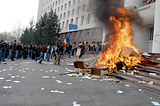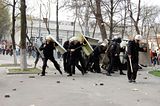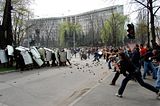 Cellphones and text messaging are widely believed to have played a crucial role in fostering the Orange Revolution in Ukraine (or at least, making the protests as widespread and successful as they were); the Berkman Center at Harvard published probably the most comprehensive study of the role that social media played in the Orange Revolution (even though I criticized some of its cyber-utopian assumptions in a recent essay for Boston Review).
Cellphones and text messaging are widely believed to have played a crucial role in fostering the Orange Revolution in Ukraine (or at least, making the protests as widespread and successful as they were); the Berkman Center at Harvard published probably the most comprehensive study of the role that social media played in the Orange Revolution (even though I criticized some of its cyber-utopian assumptions in a recent essay for Boston Review). Could it be that five years after the famous protests in Kiev's Maidan Square another technology - Twitter - will usher in another revolution in neighbouring Moldova? Will we remember the events that are now unfolding in Chisinau not by the color of the flags but by the social-networking technology used?
 If you asked me about the prospects of a Twitter-driven revolution in a low-tech country like Moldova a week ago, my answer would probably be a qualified "no". Today, however, I am no longer as certain. If you bothered to check the most popular discussions on Twitter in the last 48 hours, you may have stumbled upon a weird threat of posts marked with a tag "#pman" (it's currently listed in Twitter's "Trending Topics" along with "Apple Store", Eminem, and Easter). No, "pman" is not short for "pacman"; it stands for "Piata Marii Adunari Nationale", which is Romanian name for the biggest square in Chisinau, Moldova's capital. This is not the first time that a Twitter "tag" has been used to mobilize young people around a particular event; the most famous previous case has been that of "griots" - the tag used to report on the youth riogs in Greece, which later spread to Europe, arguably also with the help of Twitter.
If you asked me about the prospects of a Twitter-driven revolution in a low-tech country like Moldova a week ago, my answer would probably be a qualified "no". Today, however, I am no longer as certain. If you bothered to check the most popular discussions on Twitter in the last 48 hours, you may have stumbled upon a weird threat of posts marked with a tag "#pman" (it's currently listed in Twitter's "Trending Topics" along with "Apple Store", Eminem, and Easter). No, "pman" is not short for "pacman"; it stands for "Piata Marii Adunari Nationale", which is Romanian name for the biggest square in Chisinau, Moldova's capital. This is not the first time that a Twitter "tag" has been used to mobilize young people around a particular event; the most famous previous case has been that of "griots" - the tag used to report on the youth riogs in Greece, which later spread to Europe, arguably also with the help of Twitter.However, this morning things got out of hand - and, with or without Twitter's help, the crowd got much larger, reaching as many as 10,000 people, who first picketed Election Commission headquarters, the president’s residence (windows are reported to be broken - and there are also reports that this building has been stormed), and other government buildings before storming the building of the Moldovan Parliament, which happens to be just across the road.
Technology is playing an important role in facilitating these protests. In addition to huge mobilization eforts both on Twitter and Facebook, Moldova's angry youth - especially those who are currently abroad (roughly a quarter of Moldova's population are working abroad due to dire economic conditions back at home) - could follow the events on this livestream provided by a Romanian TV station - directly from the square.
 I've just spoken to a Moldovan friend who is himself a big technology fan; according to him, there is little to none cellphone coverage in the square itself (turning off cellphone coverage in protest areas is a trick that was also used by the Belarusian authorities to diffuse 2006 protests in Minsk's central square), so protesters have to leave it to post updates to Twitter via GPRS technology on their mobiles.
I've just spoken to a Moldovan friend who is himself a big technology fan; according to him, there is little to none cellphone coverage in the square itself (turning off cellphone coverage in protest areas is a trick that was also used by the Belarusian authorities to diffuse 2006 protests in Minsk's central square), so protesters have to leave it to post updates to Twitter via GPRS technology on their mobiles. The related posts on Twitter are being posted at a record-breaking rate - I've been watching the Twitter stream for the last 20 minutes - and I see almost 200 new Twitter messages marked with "pman" (virtually all of them in Romanian, with only one or two in English). In the last few hours there have also emerged several "smart" aggregators of posts on the subject, like this one - they have to contextualize what exactly is happening -- and this one for YouTube videos. Many blog posts are also being updated in real-time - minute by minute - check this one. There are also a plenty of videos on YouTube and photos, including those uploaded to Facebook.
There are also a few moving English-language Twitter posts like this - "in #pman a grenade thrown by the police has torn apart one of the protester's leg"- that would surely be perused by foreign journalists. It's hard to predict for how long this cornucopia of user-generated media would continue; my Moldovan contacts report that the authorities may have required some Moldovan ISPs to restrict Internet connection with the outside world, so the protesters might soon face difficulties in getting their reports out. All in all, while it's probably too early to tell whether Moldova's Twitter revolution will be successful, it would certainly be wrong to disregard the role that Twitter and other social media have played in mobilizing (and, even more so, reporting on) the protests. Of course, it helps that young Moldovans are sick and tired of the communist government (for a long time the only one in Europe) and there may be a few reasons to be concerned about voting irregularities but, overall, the Chisinau protests undoubtedly present an interesting case-study that I hope academic institutions like Harvard's Berkman Center and others would take on and examine in detail.
All in all, while it's probably too early to tell whether Moldova's Twitter revolution will be successful, it would certainly be wrong to disregard the role that Twitter and other social media have played in mobilizing (and, even more so, reporting on) the protests. Of course, it helps that young Moldovans are sick and tired of the communist government (for a long time the only one in Europe) and there may be a few reasons to be concerned about voting irregularities but, overall, the Chisinau protests undoubtedly present an interesting case-study that I hope academic institutions like Harvard's Berkman Center and others would take on and examine in detail.

